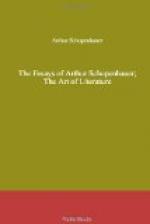From what I have said, it is obvious that to imitate the style of the ancients in their own language, which is so very much superior to ours in point of grammatical perfection, is the best way of preparing for a skillful and finished expression of thought in the mother-tongue. Nay, if a man wants to be a great writer, he must not omit to do this: just as, in the case of sculpture or painting, the student must educate himself by copying the great masterpieces of the past, before proceeding to original work. It is only by learning to write Latin that a man comes to treat diction as an art. The material in this art is language, which must therefore be handled with the greatest care and delicacy.
The result of such study is that a writer will pay keen attention to the meaning and value of words, their order and connection, their grammatical forms. He will learn how to weigh them with precision, and so become an expert in the use of that precious instrument which is meant not only to express valuable thought, but to preserve it as well. Further, he will learn to feel respect for the language in which he writes and thus be saved from any attempt to remodel it by arbitrary and capricious treatment. Without this schooling, a man’s writing may easily degenerate into mere chatter.
To be entirely ignorant of the Latin language is like being in a fine country on a misty day. The horizon is extremely limited. Nothing can be seen clearly except that which is quite close; a few steps beyond, everything is buried in obscurity. But the Latinist has a wide view, embracing modern times, the Middle Age and Antiquity; and his mental horizon is still further enlarged if he studies Greek or even Sanscrit.
If a man knows no Latin, he belongs to the vulgar, even though he be a great virtuoso on the electrical machine and have the base of hydrofluoric acid in his crucible.
There is no better recreation for the mind than the study of the ancient classics. Take any one of them into your hand, be it only for half an hour, and you will feel yourself refreshed, relieved, purified, ennobled, strengthened; just as though you had quenched your thirst at some pure spring. Is this the effect of the old language and its perfect expression, or is it the greatness of the minds whose works remain unharmed and unweakened by the lapse of a thousand years? Perhaps both together. But this I know. If the threatened calamity should ever come, and the ancient languages cease to be taught, a new literature will arise, of such barbarous, shallow and worthless stuff as never was seen before.




